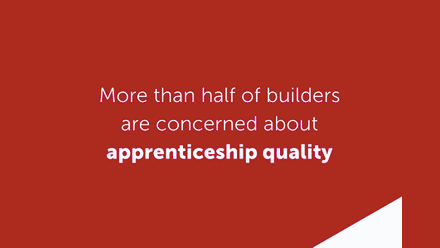Economic turbulence and cost of living pressures may well be playing their part in dramatic new findings from the Federation of Master Builders (FMB), indicating a sharp decline in both the recent workload and future enquiries for Scotland’s small, local builders.
The most recent State of Trade Survey from the FMB shows that growth in workloads, enquiries and employment levels are all continuing to contract, with enquiries dropping into negative territory for the first time since 2013, excluding the pandemic years. This means that across the country, more builders are reporting a fall in enquiry levels, compared to the number seeing a rise.
The new FMB data indicates that out of all the UK nations, the picture in Scotland is most bleak. The figures suggest both workload and enquiries in Scotland have declined to –15%. These figures raise concerns when compared to much higher confidence levels suggested by enquiry levels of 35% just last quarter.
The picture painted by the new figures is worrying for the small and local tradespeople that the FMB represents, most of whose margins are often fairly tight, even in the good times. Builders need certainty, and a clear pipeline of work. Such confidence would be created with government backing for a long-term, national programme of energy efficiency upgrades to make all our homes warmer and cheaper to heat, known as ‘retrofitting’. Today’s survey reveals support for a national retrofit strategy stands at a significant 74% amongst small builders.
The FMB State of Trade Survey, which is released on a quarterly basis, is the only survey of its kind to track the experience of small to medium-sized (SME) construction firms in the UK. The latest survey for Q3 2022 found:
A National Retrofit Strategy
- 74% of small, local builders are in favour of retrofitting UK homes.
Scottish market activity
- Workload has considerably declined compared to last quarter with a -15% reduction.
- Work enquiries have also dropped to -15%.
Market conditions
- Both workload and enquiries have decreased in Q3 2022 compared to Q2 2022 on balance in all sectors.
- A third (33%) of FMB members report a higher workload in Q3 2022 than in Q2.
- In terms of total enquiries, a third (33%) of FMB members report an increase in Q3 compared to Q2 2022.
Skills
- 20% of FMB members report an increase in the number of employees within their company’s workforce in Q3 2022
- At least one third of FMB members are struggling to recruit carpenters/joiners, bricklayers and general labourers (43%, 38%, and 34%)
Prices
- 90% reported an increase in material costs
- 67% reported an increase in wages in Q3
- 76% of builders have put up their prices for work
Gordon Nelson, Director of FMB Scotland, said: “The impact of the cost-of-living crisis on local building companies in Scotland is laid out in the results of our state of trade survey. With rising overheads hitting builders' businesses, and a client base already tightening its belt, the trading conditions are set to be tough over the months ahead. So the question is, what can be done to support the backbone of Scotland’s construction industry, local building companies?”
Nelson continued: “To address the challenge of decarbonising our existing buildings to help Scotland meet its net zero 2045 target, we will need the skills, capacity and willingness of local building firms. The Scottish Government needs to take actions to drive demand for fabric improvements and energy retrofit upgrades to be delivered on our homes.”
Nelson concluded: “This is why the FMB is calling for a co-ordinated national retrofit strategy encompassing all four nations of the UK. With around one million Scottish homes needing to have fabric improvements or low carbon heating systems installed to reduce their energy consumption, there is no time to waste.”
Further information: The latest FMB State of Trade Survey can be downloaded here.
Notes to editors
The Federation of Master Builders (FMB) is the largest trade association in the UK construction industry representing thousands of firms in England, Scotland, Wales and Northern Ireland. Established in 1941 to protect the interests of small and medium-sized (SME) construction firms, the FMB is independent and non-profit making, lobbying for members’ interests at both the national and local level.
The FMB is a source of knowledge, professional advice and support for its members, providing a range of modern and relevant business building services to help them succeed. The FMB is committed to raising quality in the construction industry and offers a free Find a Builder service to consumers.




